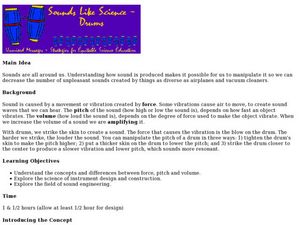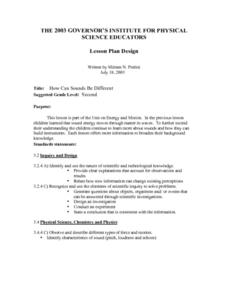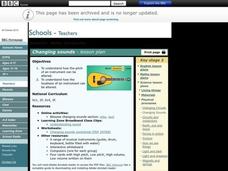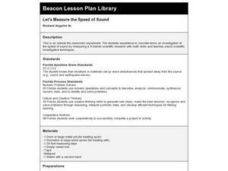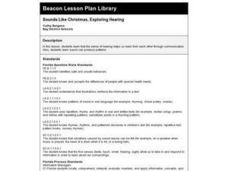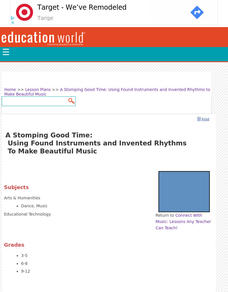Curated OER
Sounds Like Science: Drums
Students explore the science of sound. In this sound lesson, students craft drums from various materials and respond to questions regarding pitch, force, and volume.
Curated OER
Pitch
Students experience sounds with different pitches. In this pitch lesson plan, students use open pipes as they are introduced to pitch, then make Straw Pan Pipes.
Curated OER
Make a Sound Viewer
Students see, and thus better understand, the vibrations that sound makes through this simple project.
Curated OER
Vibration and Pitch
Fifth graders investigate the relation between vibrations and pitch. They observe and discuss an experiment involving a bicycle and a piece of cardboard in the spokes, listen to a comb with cardboard, and listen to various sounds and...
Curated OER
Sound
Second graders investigate the production of sound through experimentation. Working in pairs, 2nd graders receive supplies to create a sound machine. Once they create their machine and record the differences in the sounds produced.
Curated OER
Sounds Like Science - Kazoo
Students discover that energy is needed to produce sound. They see that identifying where the energy comes from enables us to control the type of sound produced. They play the kazoo and manipulate the sound in a variety of ways.
Curated OER
How Can Sounds Be Different
Second graders explore energy and motion. They investigate how sound energy moves in waves. Students explore how sounds are varied and how the instruments that make those sounds are built. They observe sounds being produced and predict...
Curated OER
Properties of Waves
Third graders observe and investigate wave properties and compare the properties of particles and waves. They fill a pie pan half full with water, place a toothpick in the center of the pie pan, then drop a marble into the pan and...
Curated OER
Changing Sounds
Students listen to sound. In this changing sounds lesson, students play instruments to help them hear volume and pitch. Students use the interactive whiteboard to experiment how change can make sounds go higher or lower.
Curated OER
Let's Measure the Speed of Sound
Third graders measure the speed of sound using scientific investigative techniques.
Curated OER
Standing Waves
In this waves worksheet, students learn about standing waves and harmonics. Then students complete 11 matching, 15 fill in the blank, and 7 short answer questions.
Curated OER
Sound for Sight
Students study echolocation and understand how dolphins use it to locate prey, escape predators, and navigate their environment. They view a video, "In the Wild-Dolphins with Robin Williams" and see first hand how dolphins communicate. ...
Curated OER
Ears and Hearing
Students explore vibrations and sound waves. In this lesson about hearing, students use experiments to determine how sound waves travel. Students use a saucepan, rice, and a plastic cover for one experiment and a tube, plastic wrap, a...
Curated OER
Do You Hear What I Hear?
Students study hearing and are able to differentiate between different sound waves. In this sound wave lesson students develop a cause and effect model that shows the parts of the ear.
Curated OER
Physics 210: 24
In this physics 210 worksheet, students answer the question of the predicted modes of oscillations heard based on the information provided in the word problems. Students apply their understanding of sound waves to answer the questions...
Curated OER
Mathematical Models with Applications: The Sounds of Music
Learners use an electronic data-collection device to model the sound produced by a guitar string. They identify the graph of a periodic situation and use the graph to determine the period and frequency of sound waves.
Curated OER
Hilarious Honker
Learners investigate sound vibrations by experimenting with a cup. In this sound waves lesson, students utilize a paper or plastic cup, string, and different household items to create different sounds by plucking the string or...
Curated OER
Sizing Up Sound
Sixth graders are introduced to the concepts of sound waves and frequency. As a class, they listen to the differences between different types of instruments. To end the instructional activity, they practice identifying low and high...
Curated OER
High or Low
For this wave properties worksheet, students will experiment to see how the sound made by vibrating a ruler is affected by the length of the part that is vibrating. Then students will answer 5 questions based on the results of the...
Curated OER
Sounds Like Christmas, Exploring Hearing
Students see that the sense of hearing helps us learn from each other through communication. Also, students explain that sound can produce patterns. They engage in a wide variety of activities that focus on the sense of hearing.
Curated OER
Architectural Acoustics
In this acoustics learning exercise, students use a chart of the speed of sound through different materials to determine which materials should be used to build certain building types. Students complete 2 short answer questions.
Curated OER
A Stomping Good Time: Using Found Instruments and Invented Rhythms to Make Beautiful Music
Students work in small groups to use everyday objects to create performances inspired by the work of STOMP. They create a system of notation to document the music and movement of a 2-minute performance.
National Council of Teachers of Mathematics
Seeing Music, Hearing Waves
In this music activity, 11th graders incorporate fractions into their music scales and counting scales. They listen to the music being played and relate it to sine waves reviewing the trig function. There are 11 questions involving sine...


